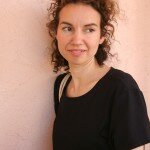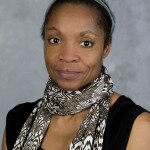PIER AT CANNES
marketacross the bay, a string of lights
never thought she’d find herself
in an Antonioni film
yet here she is and so is he—
mere witnesses to an abstraction
the dark sea and dark sky meet somewhere
_________________she thinks,
_____directing herself to find a gesture
as apt as this moment
he stares back
in irreflection
The sea and sky may kiss at the horizon
Why not we?
_____________She turns
a cartwheel instead
_____________to approach him
and yet remain distant
absurdity strikes
at the very heart
of the proposition
What a child, an American!
He is of course a French polygamist
with several children by several wives in farmhouses
scattered about the French countryside
so fated to act out
two wholly different scripts,
he says
_____________Un écrivain a dit…
_____________[A writer once said]
là où toutes les eaux se mèlent, là où il y a un delta—
[Where all the waters come together, at the mouth]
la merde l’a créé.
[shit created it.]
But what about beauty
she wonders too late
_____________doesn’t beauty equal love?
she wanders too late
the sky darkens further
_____________La bêtise
_____________[Nonsense]
is his reply
_____________
_____________
from the edge
of that shore
they part
_____________________________________________________________
Vasiliki Katsarou was born and raised in Massachusetts to Greek-born parents, and educated at Harvard College, the University of Paris I-Sorbonne, and Boston University. Her first collection, Memento Tsunami, was published in 2011 and one of its poems was nominated for a Pushcart Prize. Her work has appeared in Poetry Daily, wicked alice, Press 1, U.S. 1 Worksheets, Agave Magazine, and Regime Magazine (Australia). Her poems have also been featured in the anthologies Not Somewhere Else But Here: A Contemporary Anthology of Women and Place; Rabbit Ears: TV Poems; and Eating Her Wedding Dress: A Collection of Clothing Poems, for which she also wrote the introduction. Vasiliki has worked in film and television production in France and Greece, and written and directed an award-winning 35mm short film, Fruitlands1843, about the Transcendentalist utopian community. She is the founder and director of the Panoply Books Reading Series in Lambertville, New Jersey.





